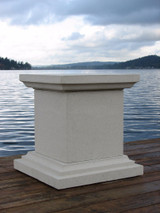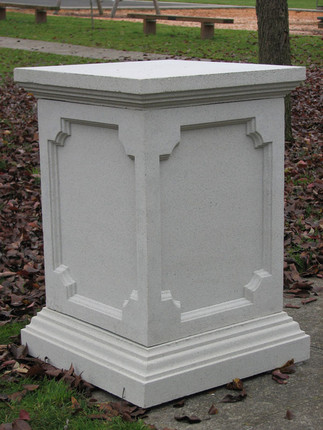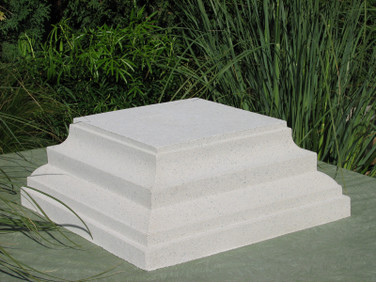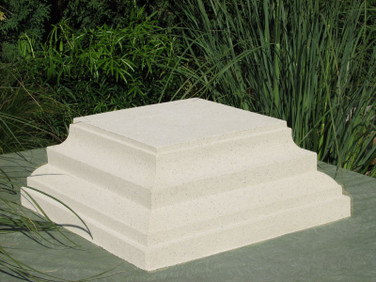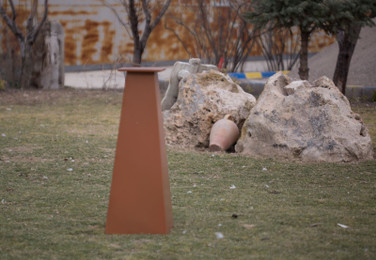Description
Cast Stone Pedestal 22" High x 21" Square
The Queen Anne Pedestal stands 22" tall with a 21" square footprint. 3-piece construction.
| SKU | Description | Top | Bottom | Height | Weight |
| NPEQA | Queen Anne Pedestal | 19x19 | 21x21 | 22 | 280 |
About Nichols Bros. Cast Stone
This pedestal is crafted from cast stone, superior to cast concrete in look and feel. Cast stone is a concrete based building material manufactured and molded to simulate natural cut stone. Nichols Bros.' dry cast products are made from zero slump concrete, using the Vibrant Tamp Method, in a rigid mold, until it is densely compacted.
The raw materials used in the product are Portland cement, Type I, white, multi-sized aggregates of manufactured or natural sand, inorganic iron oxide pigments (when required for coloring), approved admixes (poly-plex and glass fibers), and water. The nature of this mix gives it a number of advantages for use in garden and architectural applications.
Two decades of experience have enabled Nichols Bros Stoneworks to improve mix designs and curing methods to give their stone increased strength, weather tolerance and resistance to abrasion. The mid-size and larger pieces are reinforced with galvanized aircraft cable. Flat surfaces and rings are reinforced with rebar or non-ferrous pipe.
All the the mix designs meet with the standard specifications of the Cast Stone Institute for architectural cast stone.
All cast stone products ship LTL common carrier. All products are made to order and non-returnable.
Warranty Information
Because of our improved mix design and integral reinforcing, we offer a 10-year limited warranty on our dry cast stone products, assuming proper installation and maintenance. A very important factor in planter performance is drainage. Our planters are made with drain holes and they must be utilized. With every order we ship installation instructions and small rubber squares to act as spacers or pot feet. These are to lift the bottom of the planter 1/4” – 3/8” off the ground to allow proper drainage. If water is allowed to collect in the container it can lead to efflorescence and in extreme cases of ice buildup, can cause the planter to crack. The warranty is limited to manufacturer’s defects and does not cover damage from improper maintenance or installation, mishandling, collision or other misuse.
Limitations & Protection Against Abuse of Guarantee:We do not guarantee our containers from failure due to other actions which might befall the products, such as being struck, dropped or otherwise abused.
Nichols Bros. Stoneworks reserves the right to request the return, for inspection and analysis, to the Snohomish, WA location, any product for which failure is claimed, with the return packing and shipping costs incurred being borne at least initially by the claimant.
Whether or not the product is returned, any claim must be made in writing and include a full description of the location of the container, when it was most recently moved to the location where failure was first noted, its contents immediately prior to its failure upon its environment and possible cause of its failure.
Upon their review of the written claim and/or the product itself, and based upon their experience and results of any outside scientific analysis they choose to employ, if, in the sole judgment of Nichols Bros. Stoneworks the container is determined to have failed, Nichols Bros. will ship to the claimant a new, replacement container of the same size and design, at Nichols Bros. Cost, and at the same time refund the costs incurred by the claimant to have had the failed product packed and shipped to Nichols Bros.
If, on the other hand, in Nichols Bros.’ sole judgment the product failure is determined to have been caused by something other than manufacturer’s defect, Nichols Bros. will not be required to replace the container or to reimburse for the packing and shipping of the container for their inspection. Further, Nichols Bros. may, at its option, charge back any out-of-pocket costs incurred by them in determination of the cause of the failure; those costs do not exceed the initial price paid by the claimant for that container.


